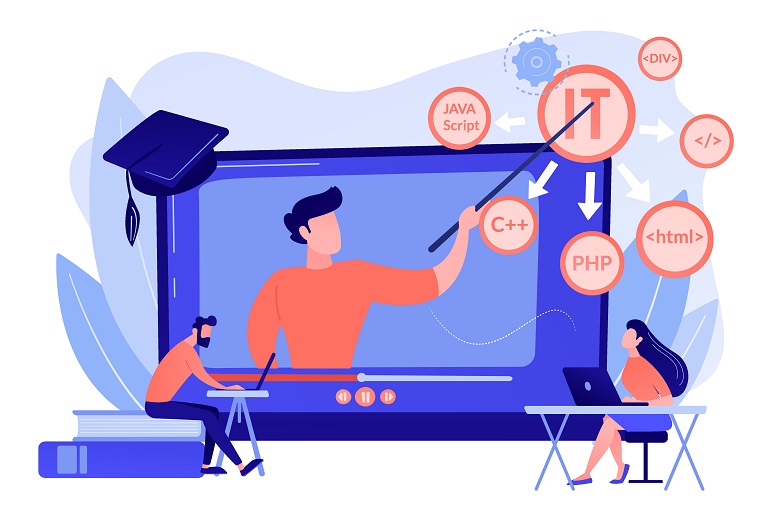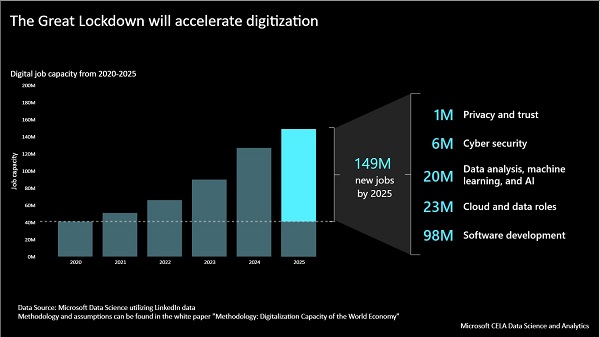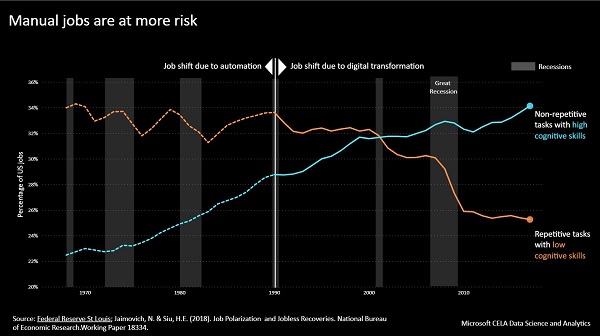Something significant is happening—Microsoft and Google have launched both free and paid technical skills education programs, and this could be transformational in many ways. It could also cause disruption to traditional programs offered by colleges and universities.
Microsoft and Google Programs Explained
Microsoft has launched its
Global Skills Initiative that will allow certified technical training in a range of high-demand skill categories. Geared toward “building a better future,” Microsoft intends to reach up to 25 million people with this program by the end of 2020, and it was designed in response to a forecasted demand for 145 million new “digital economy” jobs by 2025. The majority of forecasted opportunities are in software development (98M) and cloud and data management roles (23M).
In this
blog post, Brad Smith, Microsoft president, noted that the initiative has three primary features:
- The use of data to identify in-demand jobs and the skills needed to fill them
- Free access to learning paths and content to help people develop the skills these positions require
- Low-cost certifications and free job-seeking tools to help people who acquire these skills pursue new jobs
During the launch of this Global Skills Initiative, certification fees are getting waived for selected high-demand categories. The Microsoft program is also available through LinkedIn to bring the certificate holders together with potential employers.
Training programs are open for in-demand roles such as software developer, sales representative, project manager, IT administrator, customer service specialist, digital marketer, IT support/helpdesk, data analyst, financial analyst, and graphic designer.
Google has also announced (or responded with)
Google Career Certificates, which offers an immediate certification for the IT Support Specialist. Three others – data analyst, project manager, and user experience (UX) designer – are “coming soon.” It also includes resources to facilitate the certificate holder’s job search and interview preparation.
Why Release Them Now?
First and foremost, both companies see that their own growth and success depend on the availability of qualified technical skills. The implication is that the traditional educational paths aren’t meeting the needs of Microsoft, Google, and general customers. Also, there’s a clear message that traditional educational paths take too long, are too expensive, not broadly accessible around the globe, and aren’t specifically focused on the exponential growth in demand for new digital economy jobs. All of this is being accelerated by the “Great Lockdown” (see below) as a consequence of COVID-19.
It’s also clear that the Microsoft program is based on corporate social responsibility. The company can see that work is shifting rapidly from manual (see below) to information-based jobs, resulting in employment and economic risks to large swaths of the workforce.
We’ve seen this type of initiative work successfully in the past. Cisco’s broad and respected certification program has been a key to the growth of the Internet and Cisco’s revenues from IP Telephony, UC, conferencing and collaboration. In prior societal changes, we’ve seen effective industry-sponsored apprentice programs sponsored by guilds, trade unions, and governments. Training via military service is another great example of skills development that proves to have significant employment value.
What Are the Implications?
First of all, Microsoft and Google deserve applause for their initiatives. Our enterprise communications technology sector stands to benefit substantially from these programs. Ourselves and our peers can touch up or build our skills. Also, this will remove one of the obstacles to rapid moves into the digital economy, enabling our teams and our companies to innovate more quickly and economically.
Second, we may need to adjust our hiring standards. Will one or more of these certificates be equivalent, say, to an Associate of Arts (AA) degree from a community college? Will a certificate be sufficient for entry-level or apprentice hiring on its own or in combination with other qualifications and testing? It will be worth establishing these points soon with HR and IT leadership teams.
Third, we could see the end of the college degree altogether as the main entry point for a tech career. In the U.S., at least, there’s an outcry over the costs of higher education, with certain interest groups demanding “free college for all,” and “student loan forgiveness.” If Microsoft and Google (and others that will likely follow) are successful, the answer to those interest group demands may be provided through the typical workings of capitalistic self-interest, rather than through regulatory programs. We’ll see.
In any case, these are bold initiatives worth our attention and support. Compliments to both Microsoft and Google.
This post is written on behalf of BCStrategies, an industry resource for enterprises, vendors, system integrators, and anyone interested in the growing business communications arena. A supplier of objective information on business communications, BCStrategies is supported by an alliance of leading communication industry advisors, analysts, and consultants who have worked in the various segments of the dynamic business communications market.













